Dynamics of religious commitments of young people in Russia
The article analyzes the data collected in four regular sociological surveys (RLMS HSE, The European Social Survey, The European Values Study and Levada Center) in order to assess the dynamics of various indicators of religiousness of young people in Russia. These indicators include subjective assessment of one's own religious belief, religious affiliation, church attendance, and religious socialization. A comparison of tools (question statement, filters) on religiosity criteria is made to determine whether different methods of questioning can lead to different assessment results. In part, we argue that this effect of filtering questions can be found in different assessments of the level of affiliated believers. Comparative data analysis generally shows a slow decline in the proportion of young people with Orthodox affiliation, although there is no similar change in the subjective assessment of religiosity. At the same time, over the past 20 years, assessments of engagement in religious practices and socialization have revealed an increasing process of differentiation of faith groups among young people. The proportion of those who have never attended a religious service among young people has declined significantly due to an increase in the proportion of parishioners on holidays and those who attend services frequently. In general, we conclude that it is possible to discuss the structural changes in the religious landscape that manifest themselves in the differentiation between Orthodox and socialized groups of believers.
Figures


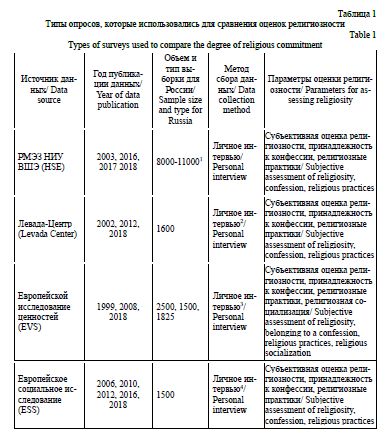
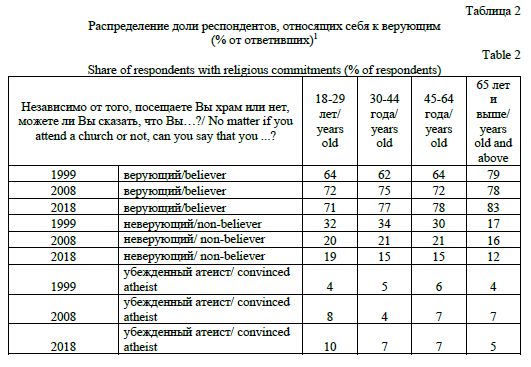

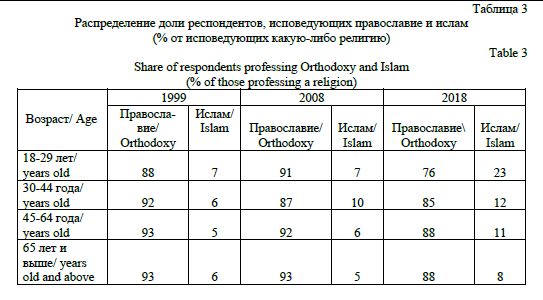

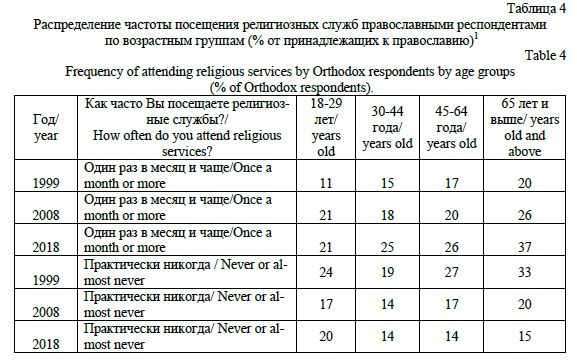

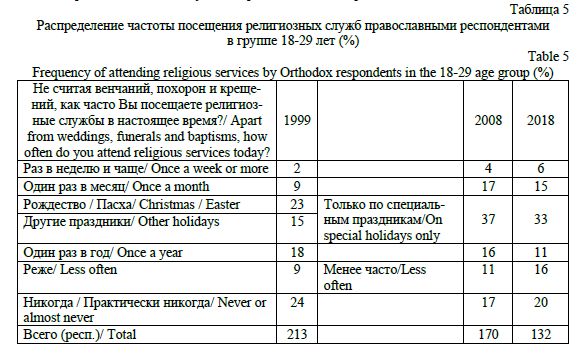

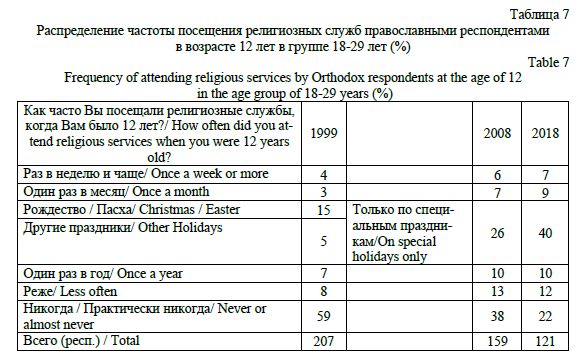
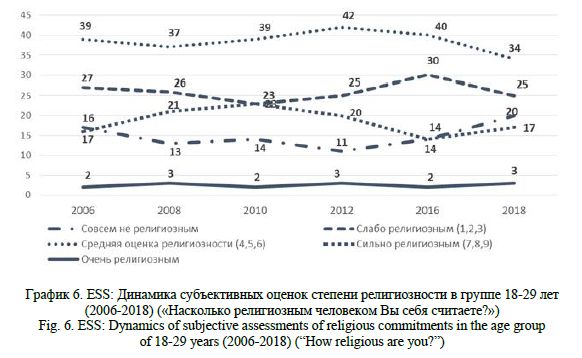
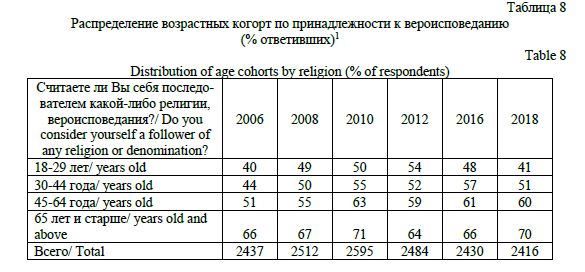

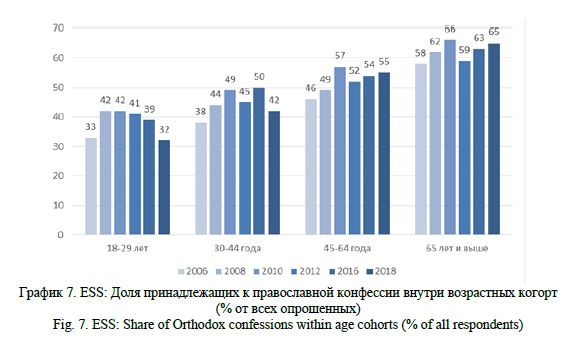
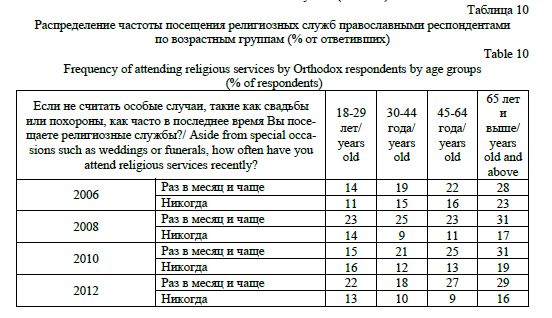

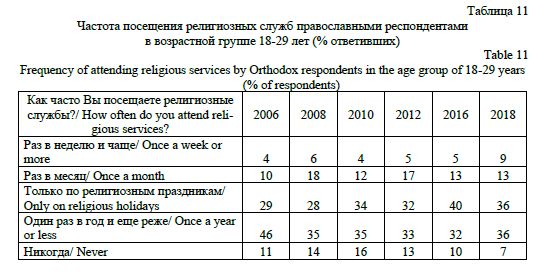
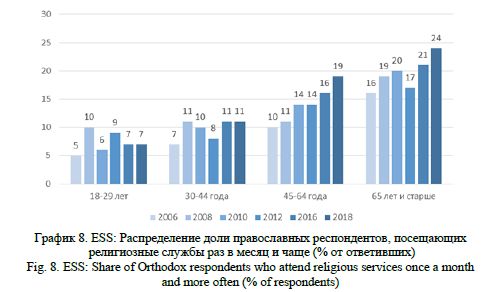

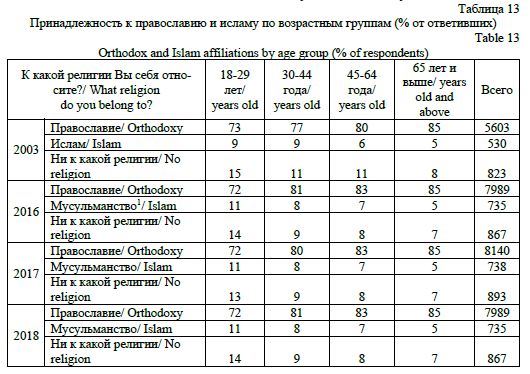


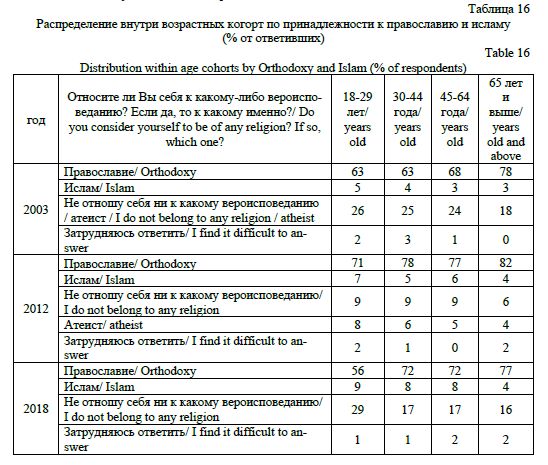
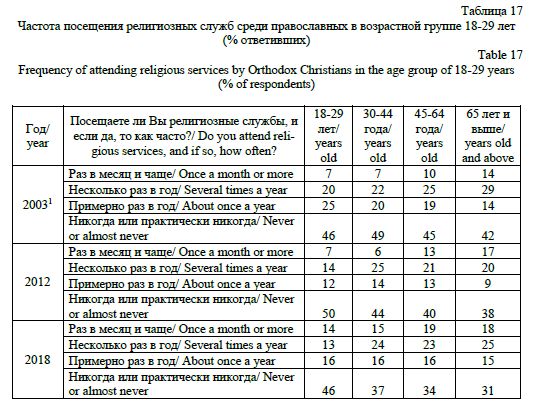
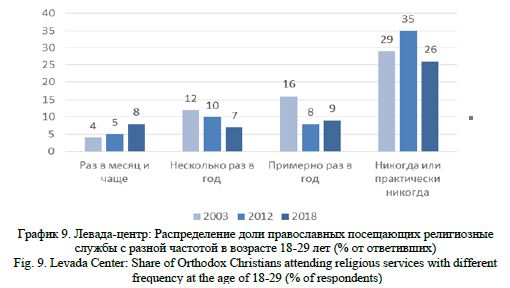
Pavlyutkin, I. V. (2020), “Dynamics of religious commitments of young people in Russia”, Research Result. Sociology and Management, 6 (3), 153-183, DOI: 10.18413/2408-9338-2020-6-3-0-10.


















While nobody left any comments to this publication.
You can be first.
Zabaev, I. V., Melkumyan, E. B., Oreshina, D. A., Pavlyutkin, I. V. and Prutskova, E. V. (2013), “The impact of religious socialization and community membership on fertility. Formulation of the problem” Demoscope Weekly, 553. (in Russian)
Zadorin, I. V. and Khomyakova, A. P. (2019), “Religious self-identification of respondents in mass polls: what is behind the declarations?”, Politeia: Journal of Political Philosophy and Sociology of Politics, (3), 161-184. (in Russian)
Kolkunova, K. A. (2015), “’Spiritual but not religious’ respondents in contemporary research”, St. Tikhon's University Review. Theology. Philosophy. Religious Studies, (6), 81-93. (in Russian)
Krikhtova, T. M. (2018), “Easter cakes on Instagram. Spectalization of Easter by young Russian women”, St. Tikhon's University Review. Theology. Philosophy. Religious Studies, (79), 98-114.
Lebedev, S. D. (2005), “Religiousness: in search of the ‘Rubicon’”, Sociological Journal, (3), 153-168. (in Russian)
Lebedev, S. D. and Sukhorukov, V. V. (2013), “A narrow path to a wrong place?”, Sotsiologicheskie Issledovaniia, (1), 118-126. (in Russian)
Mchedlov, M. P. (2005), “Are young Russians religious?”, Monitoring of Public Opinion: Economic and Social Changes Journal (Public Opinion Monitoring), (2), 38-45. (in Russian)
Melkumyan, E. B. (2018), “Annual cycles of Orthodox believers participating in the consecration of Easter food”, Monitoring of Public Opinion: Economic and Social Changes Journal (Public Opinion Monitoring), (2). 253-265. (in Russian)
Orekhanov, Yu. L. (2014), “Secularization and Postmodernity: Religious Processes in the Youth Environment in Modern Russia and Europe and Their Socio-Theological Reflection”, St. Tikhon's University Review. Theology. Philosophy. Religious Studies, (56), 101-118. (in Russian)
Orekhanov, G. (2015). “‘Patchwork-religiosität’ ‘patchwork religiosity’: peculiarities of the study of the phenomenon in the modern German context”, St. Tikhon's University Review. Theology. Philosophy. Religious Studies, (6), 94-112. (in Russian)
Prutskova, E. (2012), “Operationalization of the concept of "religiosity" in empirical research”, State, Religion and Church in Russia and Worldwide, (2). 268-293. (in Russian)
Prutskova, E. V. (2014), “Religious socialization: problems of conceptualization and correlation of micro and macro levels of analysis”, Sociology of religion in the society of late modernity, 80-88. (in Russian)
Prutskova, E. V. (2015), “The connection between religiosity and value-normative indicators: the factor of religious socialization”, St. Tikhon's University Review. Theology. Philosophy. Religious Studies, (3). 62-80. (in Russian)
Prutskova, E. V. (2017), “Religious commitment and basic values of Russians (according to the data of the European Social Research and the All-Russian Research Orthodox Monitor)”, St. Tikhon's University Review. Theology. Philosophy. Religious Studies, (72), 126-143. (in Russian)
Prutskova, E. V. and Markin, K. V. (2017), “Typology of Orthodox Russians: the problem of constructing a generalized indicator of religiosity”, Sotsiologicheskie Issledovaniia, (8), 95-105. (in Russian)
Prutskova, E. V. (2018), “Easter cakes and / or communion: a typology of Orthodox believers participating in the consecration of Easter food”, Monitoring of Public Opinion: Economic and Social Changes Journal (Public Opinion Monitoring), (2), 235-252. (in Russian)
Radaev, V. V. (2018), “Millennials Compared to Previous Generations: An Empirical Analysis”, Sotsiologicheskie Issledovaniia, (3), 15-33. (in Russian)
Roshchina, Ya. M. (2018), “The role of religion in the life of Russians”, in Kozyreva, P. M. (ed.) The Bulletin of the Russian monitoring of the economic situation and health of the population of the Higher School of Economics, 8, Higher School of Economics, Moscow, Russia, 100-112. (in Russian)
Sinelina, Yu. Yu. (2001), “On the criteria for determining the religiosity of the population”, Sotsiologicheskie Issledovaniia, (7), 89-96. (in Russian)
Tikhomirov, D. A. (2017), “Features of religious commitment of Moscow students”, Monitoring of Public Opinion: Economic and Social Changes Journal (Public Opinion Monitoring), (3), 177-191. (in Russian)
Uzlaner, D. (2020), “The end of the “pro-Orthodox consensus”: religion as a new split in Russian society”, The New Literary Observer, (3), 96-116. (in Russian)
Chesnokova, V. F. (2005), A narrow path: The process of churching of Russian population at the end of the XX century, Akademicheskiy proekt, Moscow, Russia. (in Russian)
Bullivant, S. (2018), Europe’s young adults and religion: Findings from the European Social Survey (2014-16) to inform the 2018 Synod
of Bishops.
Halman, L. and Van Ingen, E. (2015), “Secularization and changing moral views: European trends in church attendance and views on homosexuality, divorce, abortion, and euthanasia”, European Sociological Review, 31 (5), 616-627.
Mazzucchelli, S. and Lomazzi, V. (2016), “Etica e ricerca sociologica: neutralità o impegno verso i valori? Analisi di un caso esemplificativo: l’european values study”, Sociologia e Politiche Sociali.
Tomka, M. (2006), “Is conventional sociology of religion able to deal with differences between Eastern and Western European developments?”, Social compass, 53(2), 251-265.
Vrublevskaya, P., Moberg, M., and Sztajer, S. (2019), “The role of grandmothers in the religious socialization of young adults in post-socialist Russia and Poland”, Religion, 49 (2),
201-220.
Zabaev, I., Mikhaylova, Y. and Oreshina, D. (2018), “Neither public nor private religion: the Russian Orthodox Church in the public sphere of contemporary Russia”, Journal of Contemporary Religion, 33 (1), 17-38.
The project was supported within the framework of the program of PSTGU Development Foundation in 2018-2021.